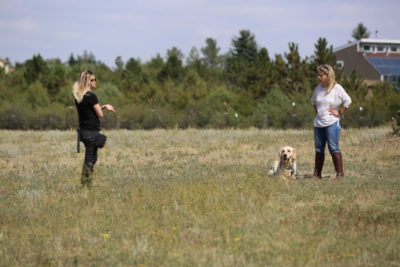Where do Great Dog Trainers Come From?
Posted on September 6th, 2018 by FetchMasters in Uncategorized

Great dog trainers don’t just happen. Lately I’ve been thinking a lot about what factors go into making good trainers. Here are the factors I consider the most important.
A Great Attitude and Work Ethic
Contrary to what you might imagine, dog training is not always easy or fun. Success is based on persistence, calmness, thoughtfulness, patience and hard work. We learned long ago not to hire anyone who does not have the psychology to exhibit those traits.
In fact, when we hire new people, we’d rather them have the right personality rather than dog training knowledge or experience. You can teach people to train dogs, you cannot change their psychology. One rotten apple is not good for dogs, fellow trainers, or clients.
Current Dog-Behavior Knowledge
The more we learn about dogs, the more we discover that many of the theories of the past have been scientifically disproven. Additionally, just because dog trainers can get a dog to do something based on antiquated theories doesn’t mean the theories are correct or represent best practices. People once thought the earth was flat, and they successfully navigated the seas under that premise. They also once thought that everything a dog does is based on its desire to exert dominance. People once thought domesticated dogs should be dealt with like wolves in a pack. You get the picture.
Supervised Experience

Expert feedback is critical to developmental success.
Practice does NOT make perfect. PERFECT practice makes perfect. Some dog trainers take cases they should not take to gain experience. I did that. It resulted in me being inefficient, ineffective and sometimes downright wrong-headed in my approach.
Fortunately, I had a lot of colleagues in my area to learn from. While eventually I got most of my flaws worked out, I do not advocate such a spotty approach to the craft of training dogs.
Instead, all our dog trainers start in our board-and-train environment and receive instruction, direction, practice and supervision. They are taught the fundamentals of dog behavior and work with numerous dogs. This way, they gain invaluable knowledge, experience and tutelage until they can work effectively with dogs of various temperaments and sizes and solve most common behavior problems.
The Purposeful Development of Skillfulness
Many of my dog trainer friends are sick of me talking about the development of skillfulness — an obsession of mine. If you want a full treatise on it, visit our Dog Trainer School page.
Suffice it to say true skillfulness does not come through knowledge alone. It must be synthesized with experience and practice. Knowledge without experience is not enough for a boxer or an airline pilot … it’s not enough for dog trainers either.
Well-Developed Communication Skills
Dog trainers often have to communicate deeply and personally with clients. And sometimes the messages that need to be communicated are not easy ones. It takes a special combination of caring, professionalism and tact to help people solve their part of the canine behavior algorithm.
A Genuine Concern for People
Ask any dog trainer if they care about dogs, and they will say yes. But there is a flavor of dog trainer that chooses to work with dogs because they don’t like people. The facts are: dogs do not pick up the phone and ask for help; dogs do not pay the fees; and dogs do not change on their own without the involvement of their humans.
Additionally, most dog training scenarios contain a large portion of owner-training. If a dog trainer is not interested in patiently working with people, their results will show it.
Wanting to help people is every bit as important as wanting to help dogs … occasionally even moreseo.
What factors do YOU think go into making a great dog trainer?
« Previous Post • Next Post »
